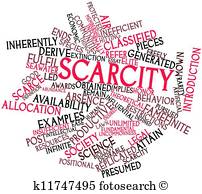Scarcity

Scarcity means that we place more value on resources that are scarce than those that are in abundance.
In psychological terms, this can play out when we focus our attention on what we do not have rather than what we have. It also relates to desire and a grasping mindset, and to status and comparisons, and the ego. Therefore, it is a very important term.
What are some examples of scarcity? If you are living paycheck to paycheck because there is a scarcity of money, you will develop tunnel vision and focus much of your attention on how to get more money or on the fact that you can’t get more money; you may feel that your relationship is not great and become obsessed with all the ways it is not working for you and think there is someone better out there; it may be that you walk into your home and immediately see only what needs to be done, instead of the things that have already been done; there is a popular acronym called FOMO, fear of missing out — this can point to the fact that there is a scarcity of certain kinds of experiences and it also falls into the category of anxious grasping – thinking that, because you missed an event, you have lost something valuable. We sacrifice a lot for our future happiness, which may or may not manifest. Also some experiences and objects make you happy for a short time, but you become habituated to them and memory or the joy of ownership fades quickly. You might even think there’s something wrong with you because you feel no joy through acquiring and consuming. The advertisements drill into your head that the thing that is being consumed makes other people happy, why not you? It could take the form of hijacking your consciousness through fear and disappointment so that you cannot appreciate the now. It can cause anxiety and chronic stress.
Having a scarcity mindset is like anchoring one’s self to an illusion rather than the moment and it can leave one feeling empty and unfulfilled. Scarcity can hijack your consciousness and instill anxiety, which can easily get you stuck in a negative feedback loop.
Abundance is the antonym for scarcity. Just like scarcity is a mindset, so is abundance. I am not referring to having unlimited resources, I am referring to being aware of what is already there and directing psychological resources to the following practices:
- Be kind. It means that you are somewhat open-minded and non-judgmental and have compassion for others.
- Practice altruistic joy – taking joy in other’s good fortune or happiness.
- Focus your attention on what you are experiencing in the present moment – your breath and bodily sensations, scents, sights, sounds, tastes, textures. The more you do this, the richer the moment becomes.
- Do not dwell on losses, find value in every experience. Suffering brings wisdom. If you have lost a loved one, try to connect your heart to their energy. You might even sense their presence or see signs of their presence. This is important to healing.
- Look for opportunities and take risks. It’s okay to fail, as long as you give yourself positive messages and derive meaning from the experience.
- Do not procrastinate, you are devoting more energy to worrying and feeling guilty than it takes to complete the task. Procrastination is a passive-aggressive action taken against the self.
- Create a warm and inviting home by surrounding yourself with meaningful objects and get rid of clutter.
- Have fun, manufacture enthusiasm, fake laughter.
- Connect to nature, it is abundant. If there is no water, mountains, grass, trees, plants or flowers that are easily accessible, look up.





